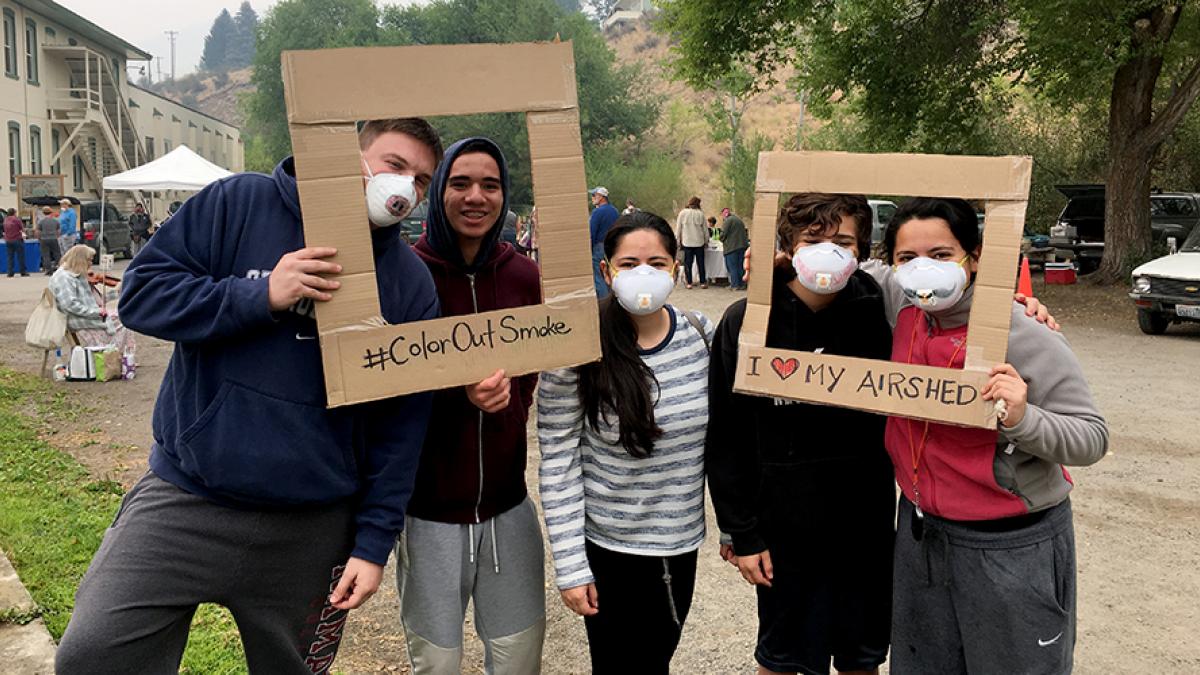
EDGE Community Engagement Core provided facemasks as part of an activity meant to lift spirits in the smoke-choked Methow Valley.
Typically, summer in the Methow Valley is a time to hike, bike, camp, river raft, mountain climb, attend outdoor arts festivals, and otherwise enjoy the spectacular natural setting.
Lately, things are different. Wildfire season has hit the Methow Valley hard the last five years, causing hazardous smoke conditions that can persist for weeks on end, often making residents feel trapped and isolated.
Recommendations from public health agencies are commonly limited to staying inside and wearing masks, but those messages aren’t always helpful for people who have been losing whole weeks of summer, cooped up inside. For farmers and agricultural workers who need to harvest, and carpenters who must complete essential outdoor projects before snow falls, staying indoors or leaving the area is not an option. And yet going outside with masks can add to the feeling of apocalypse.
Kelly Edwards, Director of Engagement with the University of Washington Interdisciplinary Center for Exposures, Diseases, Genomics and Environment, wanted to create a different type of public engagement activity, one that would bring community members together in a fun and positive way while providing information to support good day-to-day decision-making.
The outreach she envisioned would complement the Methow Valley Clean Air Project (MVCAP), which placed Purple Air monitors throughout the Valley to provide residents with timely, highly localized air quality reports that support daily decisions like whether or not to go for a run and, if so, where.
To help create the right messages, Edwards partnered with two local community members—Anthony Twig Wheeler, an international leader in somatic therapy and Robin Baire, a clinical herbalist. Wheeler makes regular appearances on KTRT, the local radio station, to talk about managing stress during wildfire season. Baire specializes in teas and tinctures that can combat the inflammatory response triggered by smoke exposure.
A volunteer with the Methow Valley Clean Air Project. Photo by Kelly Edwards.
Together with community health expert Rachel Levi and Amanda Durkin, an undergraduate intern in the Department of Environmental and Occupational Health Sciences who works with Dr. Nicole Errett and MVCAP, Edwards, Wheeler, and Baire set up a booth at the Twisp Farmer’s Market last Saturday where they emphasized support for the body’s natural defenses. Wheeler set up comfortable chairs for people to sit in and talk, Baire provided samples of tea and anti-inflammatory tinctures, and Edwards and Durkin passed out air masks provided by the EDGE Center, encouraging people to color on them with non-toxic markers.
“We wanted to give people the right kind of masks,” says Edwards, “but we also wanted them to make them their own. Adding color made them more fun to wear and also kept people from looking like they were sick.” The masks were rated N95 which means they filter out the tiny particulates that pose a health risk. But unlike masks provided by other public health agencies, they also had an air-exchange pocket at the nose that made exhalation easier and kept internal temperatures more comfortable.
The mask activity drew people from age three to 86. Along with the masks, Kelly distributed a handout designed to be accessible to an elementary school audience with simple messages about what’s in smoke and how you can take care of yourself until it passes. The booth also demonstrated simple DIY home air filters that improve indoor air quality. Taping a furnace filter with a MERV rating of 10 or higher to a regular box fan helps remove PM2.5 that infiltrates everything, including our homes.
The positive, action-oriented activity was well-received by a community hit hard by smoke for the last five summers. Edwards says that one of the biggest insights from the engagement activity was recognizing the benefit of framing simple, helpful information in a positive way. One elder community member pointed to the last suggestion “Remind yourself that you’re OK and the smoke will go away again,” and said, “This is what I really needed to hear today.”
Edwards and crew will be back at the Twisp Farmer’s Market for Labor Day weekend and plan to do more stress-less activities this weekend at a community dance party organized by the local radio station KTRT and Wheeler. Along with Elizabeth Walker of the MVCAP, the UW EDGE Center plans to further develop, test, and disseminate positive and nuanced public health messaging around smoke preparedness and disaster response.

